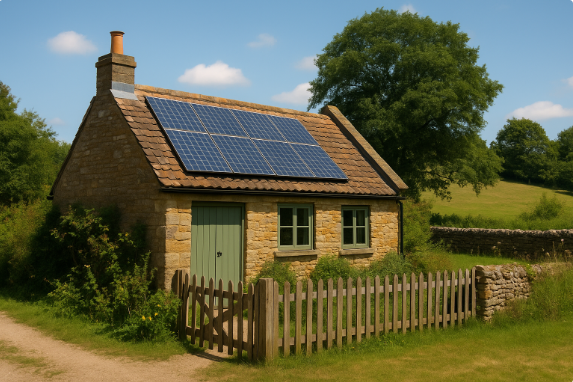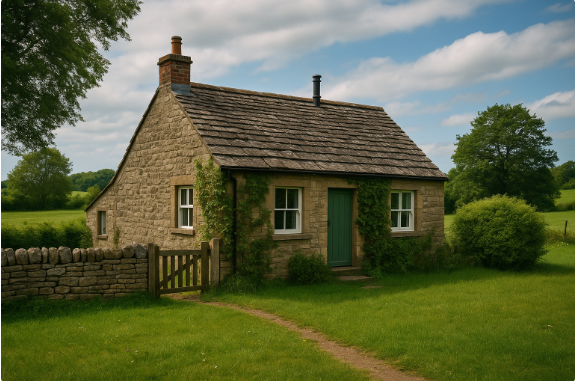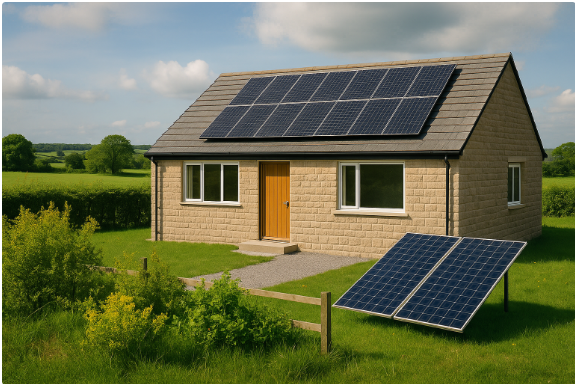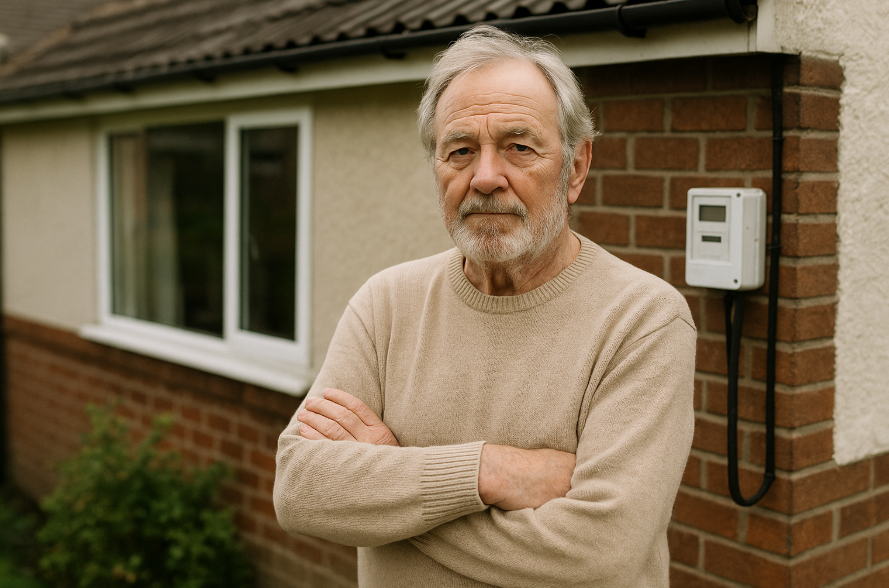Imagine living in the UK for over 50 years without ever receiving an electricity bill. No standing charges, no tariff hikes, and no energy suppliers involved. While it may sound far-fetched, it is entirely possible — and legally achievable — through a combination of renewable energy systems, lifestyle adjustments, and energy independence. This article explores “I Have Not Paid a Single Electricity Bill Since the Year 1970”, and how the same approach can still work in modern-day UK.
How can someone live without electricity bills in the UK?
The foundation of a bill-free life lies in living off-grid — not being connected to the national electricity grid and generating one’s own power independently.
What motivated the shift toward off-grid living?
People who adopted this lifestyle decades ago often did so due to:
-
Rising energy costs
-
A desire for environmental sustainability
-
The appeal of self-reliance
-
Remote or rural living situations
Going off-grid in the UK may have been rare in the 1970s, but it was achievable by those who were willing to invest in alternative energy systems and adjust their lifestyle accordingly.
What energy systems are used to avoid electricity bills?

To live without paying for electricity, a home must be completely energy self-sufficient. This typically involves combining renewable energy technologies that can power appliances, lighting, heating, and even internet systems.
What renewable energy systems are commonly used?
-
Solar photovoltaic panels (main electricity source)
-
Wind turbines (especially useful during UK winters)
-
Battery storage systems (for night-time and cloudy days)
-
Wood-burning stoves (for heating and cooking)
-
Gravity-fed spring water systems (for water needs)
“Off-grid systems in the UK work best when solar is combined with wind for year-round energy supply.”
— Energy Saving Trust, UK
How does a basic solar-powered system work?
| Component | Description |
|---|---|
| Solar Panels | Capture sunlight and generate electricity |
| Charge Controller | Regulates power flow and prevents overcharging batteries |
| Battery Bank | Stores electricity for use when solar isn’t available |
| Inverter | Converts stored DC power into usable AC electricity |
This combination ensures uninterrupted power even during the UK’s unpredictable weather.
Is it legal to go off-grid in the UK?

Yes, off-grid living is legal in the UK. There are no laws requiring a household to be connected to the national electricity grid. However, there are certain requirements and responsibilities:
What legal considerations apply?
-
Land must be owned or leased legally
-
Energy systems must comply with UK building regulations
-
Off-grid sewage and water systems must meet health and safety standards
-
No illegal connections or bypassing of the national grid
“The UK government supports decentralised renewable energy solutions and low-carbon living.”
— Ofgem Representative
Off-grid homes are also eligible for certain grants and incentives that support renewable technology.
How is daily life managed without the grid?
Living off-grid in the UK does not mean giving up comfort or modern amenities. Instead, it involves making energy-conscious choices and using high-efficiency technologies.
How are appliances powered without the grid?
-
LED lighting for low power usage
-
12V DC fridges to reduce energy loss through conversion
-
Solar ovens or wood stoves for cooking
-
Satellite internet systems powered by stored solar energy
What habits help conserve energy?
-
Turning off devices when not in use
-
Running high-demand appliances during daylight hours
-
Using energy-efficient alternatives (e.g., manual tools, gas cookers)
-
Monitoring battery storage levels regularly
These practices promote energy mindfulness, which is key to successful off-grid living.
Is it possible to live without electricity bills in the UK today?

With modern technology and government support, avoiding electricity bills is more achievable now than ever before. Both rural and some semi-urban residents are choosing to move off-grid, partially or fully.
What steps are needed to live without electricity bills?
-
Install solar panels with enough capacity for daily use
-
Add battery storage to power the home at night or during bad weather
-
Integrate wind turbines for seasonal balance
-
Use non-electric heating options like wood or biomass
-
Switch to efficient, low-power appliances
What are the benefits of living off-grid?
-
Zero electricity costs
-
Total energy independence
-
Reduced carbon footprint
-
Freedom from energy providers and price hikes
Are there any challenges?
-
High initial setup costs
-
Learning curve in energy management
-
Ongoing maintenance of systems
What is the cost of setting up an off-grid system in the UK?
| System/Component | Estimated Cost (GBP) |
|---|---|
| 5kW Solar Panel Setup | £5,000 – £8,000 |
| Battery Storage System | £3,000 – £6,000 |
| Inverter & Controller | £800 – £1,500 |
| Small Wind Turbine | £2,000 – £4,000 |
| Off-Grid Plumbing/Water | £1,000 – £2,500 |
| Installation & Labour | £2,000 – £4,000 |
| Total Setup Cost | £13,800 – £26,000 |
This may seem expensive upfront, but over time, the savings from not paying electricity bills add up significantly.
Is going off-grid worth it financially and environmentally?

For those who value independence, sustainability, and long-term savings, going off-grid in the UK can be a rewarding investment.
Benefits include:
-
No more bills
-
Stable energy supply
-
Minimal environmental impact
-
Full control over usage and supply
With energy prices continuing to rise and the UK focusing on reducing carbon emissions, off-grid living is becoming not just a personal choice, but a future-proof solution.
How long can you go without paying an electric bill in the UK?
Energy suppliers in the UK typically allow 14 to 28 days from the bill date for payment, depending on your agreement. After this period, late fees may apply, and the provider can take further action such as:
-
Sending payment reminders or final notices
-
Passing the debt to a collection agency
-
Installing a prepayment meter under warrant
-
Reporting the non-payment to credit reference agencies
If the bill remains unpaid beyond a few months, suppliers may take legal action or request a County Court Judgment (CCJ). It’s advisable to communicate with the supplier early to arrange a payment plan if you’re struggling.
Can electric debt be written off in the UK?
Yes, electric debt can be written off under specific conditions, especially if the customer is:
-
Facing serious financial hardship
-
Eligible for government support schemes like the Fuel Direct Scheme
-
A victim of supplier billing errors
-
Dealing with debts older than six years, which may be statute-barred under the Limitation Act 1980
Charities like StepChange and Citizens Advice often help customers negotiate with suppliers for partial or full debt relief. Some energy companies also offer their own hardship funds or grants.
Conclusion: Is Living Without Electricity Bills in the UK a Real Possibility?
Living without ever paying an electricity bill since 1970 may sound like an extreme case — but it proves what’s possible when renewable energy, off-grid technology, and long-term planning come together.
In today’s UK, with rising energy prices, environmental pressures, and growing support for self-sufficiency, this lifestyle isn’t just a fringe dream. It’s a practical, legal, and increasingly popular choice for homeowners willing to make the investment.
Whether aiming for full independence or simply reducing reliance on the grid, the goal is the same: energy freedom. And with the right knowledge, setup, and habits, anyone in the UK can drastically cut — or eliminate — their electricity bills.
FAQs
Can a home in the UK really run without any electricity bill?
Yes. By installing renewable energy systems and disconnecting from the grid, a household can eliminate all electricity bills legally.
Is it legal to disconnect from the UK grid?
Yes. There are no legal obligations to remain connected, provided systems meet safety and environmental standards.
How far back can an electricity company charge?
Suppliers can only charge up to 12 months back if the fault wasn’t the customer’s.
Is it illegal to not pay energy bills?
No, but it can lead to disconnection, debt collection, or court action.
Can I get my electric debt written off?
Yes, in cases of billing error, financial hardship, or if the debt is statute-barred.
Can you go to jail for not paying electric bill in the UK?
No, unpaid electricity bills are a civil matter, not a criminal offence.
I have not received an electricity bill letter — what should I do?
Contact the supplier to avoid backdated billing or missed payments.
What happens if you don’t pay the electric bill and move out?
The supplier may pursue the debt, and it can affect your credit history.

I’m Joe Chris, co-author at ukbusinessmag.co.uk and a long-time enthusiast of all things business and finance. My background is in digital marketing and e-commerce, and I love diving into trends that impact the UK business landscape. Through my writing, I aim to make useful, real-world advice accessible to business owners.



